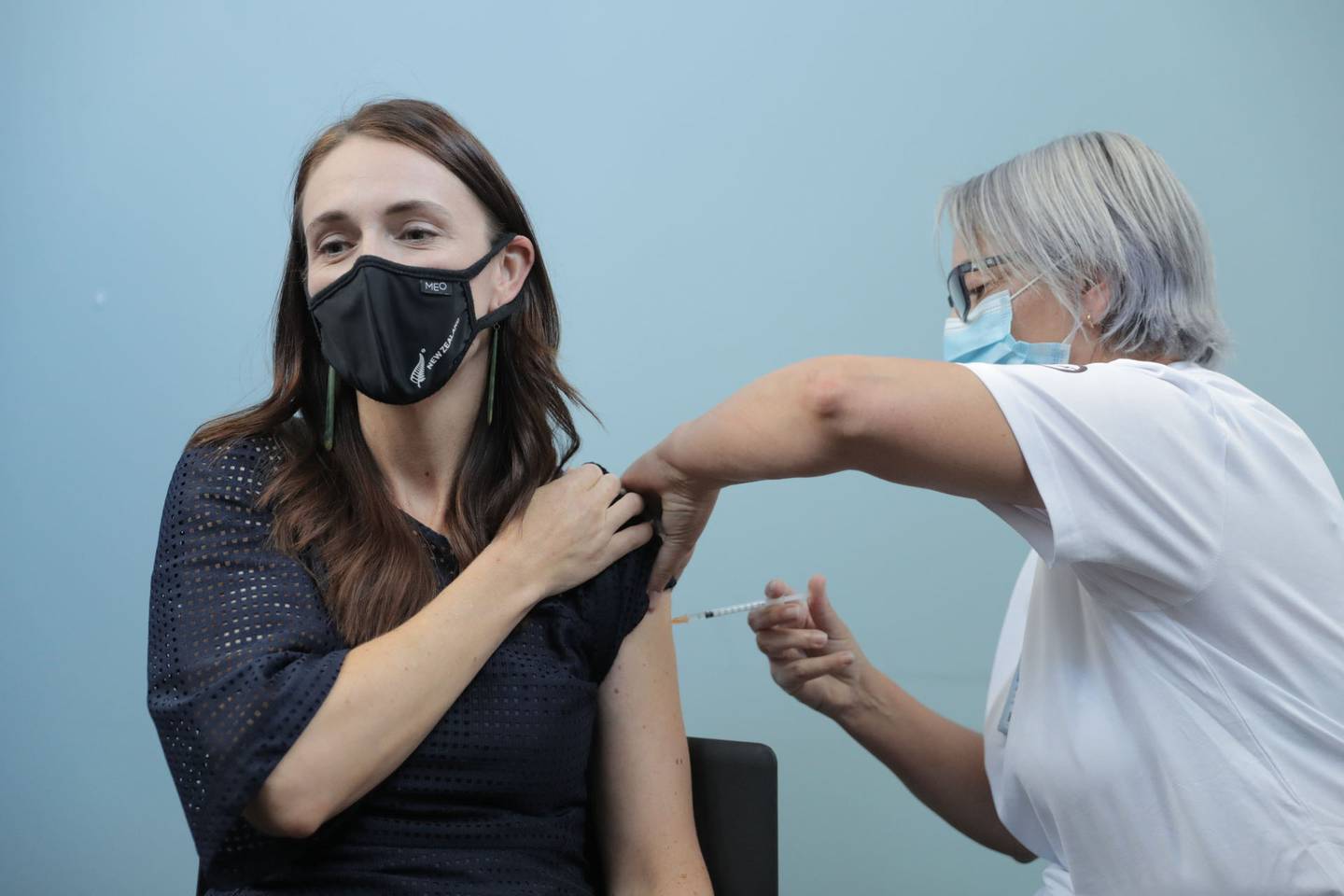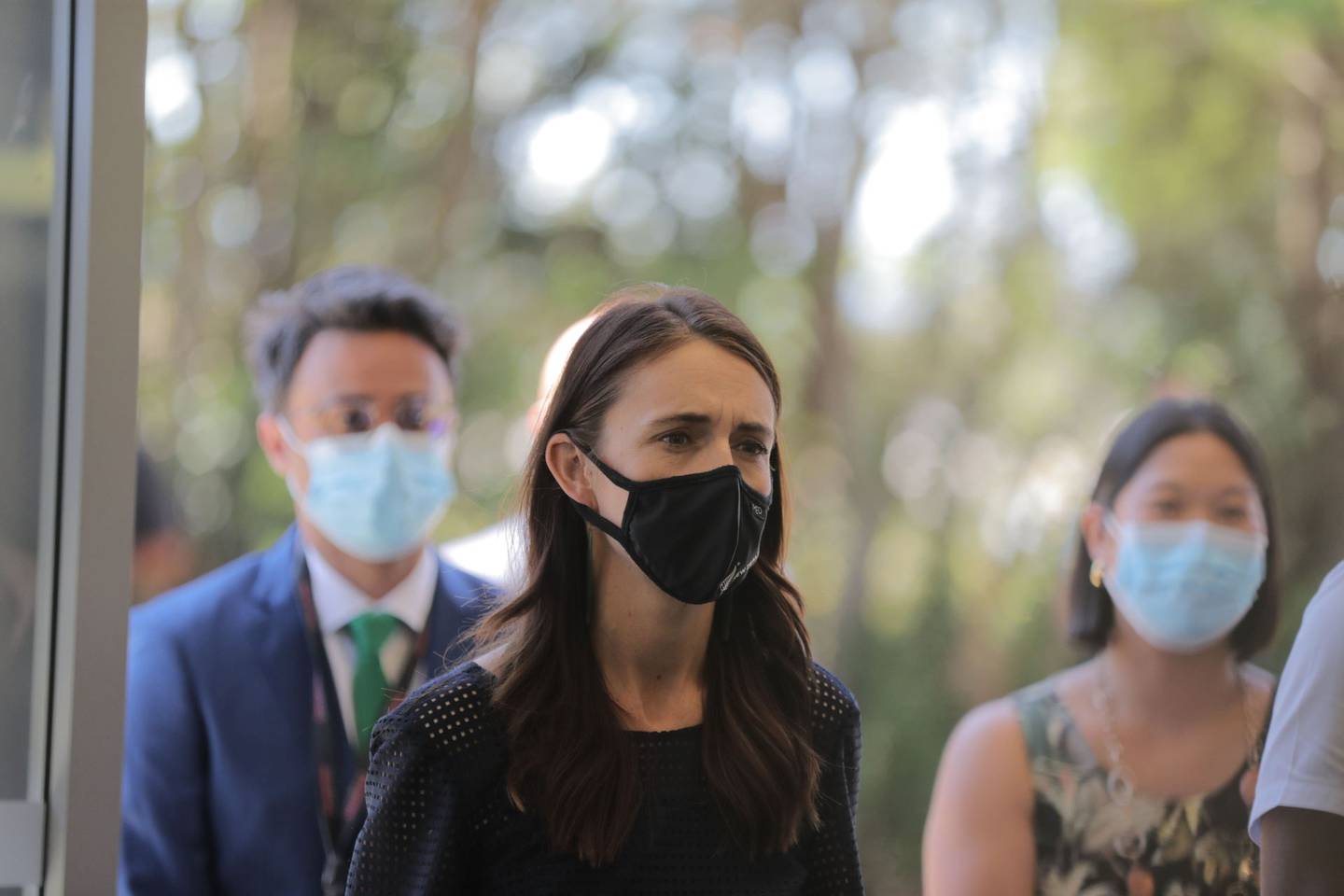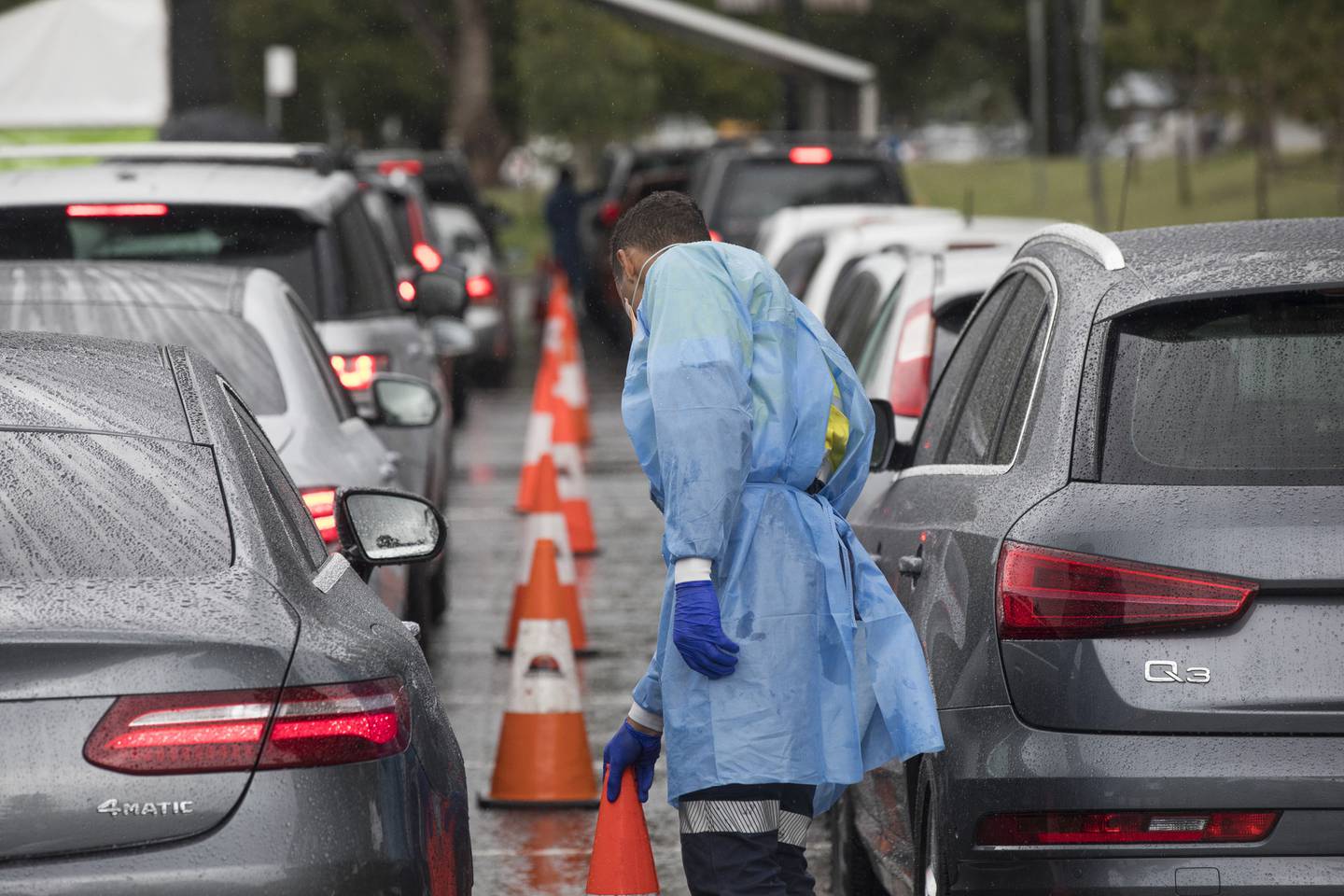Omicron's arrival in the community is a matter of "when, not if" Prime Minister Jacinda Ardern says.
Ardern is visiting an Auckland vaccine centre today, where she received a third booster jab.
"At some point we will see Omicron in the community," she told reporters.
Cabinet is not meeting today but several ministers with portfolios central to the Covid-19 response will meet tomorrow to discuss issues including whether Northland moves to the red light system.
A decision on any traffic light setting changes might be announced on Thursday.

Prime Minister Jacinda Ardern receives a third booster jab today in Auckland. Photo / Michael Craig
Meanwhile if the Omicron variant started spreading in the community, the red traffic light level would probably be activated.
The traffic light system was designed to deal with surges, outbreaks and new variants.
"All of the work we did had that in mind," Ardern said.
It was important to prepare for the potential arrival of Omicron, and there was no way of knowing how well current border restrictions would withstand the new variant.
"For Omicron we know ... you will have greater protection with a booster against Omicron."
Omicron presented specific challenges but New Zealand could at least learn from other countries where the highly infectious variant had started spreading widely.
Ardern advised everyone to get booster shots as soon as possible.
"Tonight is another milestone day in the vaccination campaign," Ardern said.
"Over the course of the summer, through extraordinarily hard work ... New Zealanders have had the break that we hoped they'd get."
But Ardern said the Omicron variant added volatility to the situation.
"You'll see that ... through vaccination and through restrictions we've managed to get Delta down to extraordinarily low levels," she added.
Additional contacts who shared a bus trip with the MIQ worker infected with Omicron were now being tested, the Prime Minister said.
Some people who were getting booster shots were also bringing children in to get their first shots of the paediatric dose.

Prime Minister Jacinda Ardern is visiting an Auckland vaccine centre today and will have her third booster shot. Photo / Michel Craig
From today Kiwi children aged 5-11 can receive the vaccine.
Ardern said anybody who wanted to access boosters or shots should not be blocked.
"We're all motivated by the same thing, and it's that what we want to look after one another," Ardern said.
"It's not about the Government here. It's about what the best advice possible is telling us.
"Demand for boosters [is] around the 41,000 to 47,000 mark," she said of daily requests for boosters.
There was ample capacity and the healthcare system could handle higher daily numbers.
Associate Health Minister Peeni Henare said the Government was working with iwi leaders to ensure the children's vaccine roll-out would be effective.
"As we do that, we look towards the schools, as eventually schools will reopen."
Consultant developmental paediatrician Dr Jin Russell said research showed if school sites were opened up to vaccinations, that would bring typically hard-to-reach communities into the vaccine roll-out's orbit.
"No-one's child is going to get vaccinated without their permission," Russell said, indirectly addressing parents.
"It is a smaller dose ... it produces a very good immune response and it is very safe."
Earlier, the head of Ngāti Whātua Ōrākei has issued a strong challenge to the Prime Minister on her visit to the iwi-led vaccination centre in east Auckland.
Iwi whai māia Rangimarie Hunia told Ardern of the success the iwi had seen by organising its response by what would suit whānau.
"We have to do whatever we can do to keep our babies safe," she told Ardern.
Hunia urged Ardern to ensure iwi were part of the planning process, as opposed to having to react to Government policy implemented without iwi consultation.
Experts urge return to 'flattening the curve' for Omicron
Meanwhile, New Zealand could meet an impending Omicron outbreak by pivoting its response to the "flatten the curve" approach it entered the pandemic with two years ago, public health experts say.
In a new commentary, Otago University's Professor Michael Baker, Dr Jennifer Summers, Dr Amanda Kvalsvig, Dr Matire Harwood and Professor Nick Wilson have listed steps the Government could take before and after the fast-spreading variant took hold here.
The public health experts say that while Omicron typically caused less severe illness than Delta, it was driving explosive outbreaks, and could go on to infect half the population of Europe within two months.
"Therefore, a poorly controlled Omicron outbreak in New Zealand risks overwhelming the health care system, increasing inequities, and disrupting essential services as is being seen overseas," they said.
"The experience of Australia probably provides the best example of what New Zealand can expect to see, given that its population immunity has largely come from vaccination rather than previous uncontrolled waves of infection and vaccination coverage is similarly high to New Zealand."
Their pandemic waves, mainly driven by Omicron, now appeared to be peaking in New South Wales and Victoria.
They are also showing that Covid-19 hospitalisations and deaths were largely uncoupled from these huge waves of infection, but were still occurring in relatively high numbers, putting severe strain on health care capacity in Australia and other essential services.
The good news, they added, was that some countries were now emerging from Omicron outbreaks, which resulted in far fewer deaths than previous outbreak waves.
The researchers repeated earlier calls to delay Omicron's arrival here – something they said would require cutting the number of infected travellers arriving.
"The number one priority should be taking rapid action to turn down the tap on the number of infected cases arriving in New Zealand, as this country has done before," they said.
"That means doing a risk analysis of where the cases are coming from, and if we're getting more than a certain proportion from some source countries, limiting travel from them until conditions change."
New Zealand also needed to urgently tighten pre-departure testing requirements, potentially by requiring rapid antigen tests at overseas airports immediately before departure, alongside current PCR testing within 48 hours of boarding.

The experience of Australian outbreaks - like that in New South Wales - probably offered the best example of what we could expect when Omicron arrives, experts say. Photo / Getty Images
In the meantime, they said health authorities should work toward eliminating Delta in New Zealand, which would put the country in a better position to tackle Omicron.
Achieving that goal could mean making much greater use of MIQ facilities to isolate Delta cases, and better supporting any cases still quarantining at home.
Another reason to try to delay Omicron was to allow more time to roll out booster shots, which still provided relatively good protection against the new variant, and to get as many young children vaccinated as possible.
"Vaccination is particularly important in New Zealand because there has been minimal exposure to widespread circulating virus," they noted.
"By contrast, in the UK which has high vaccine coverage, high booster uptake, and almost two years of exposure to circulating virus, about 97 to 98 per cent of adults test positive for SARS-CoV-2 antibodies."
The roll-out of boosters and vaccination of children was a particularly important opportunity to prioritise delivery to Māori, Pasifika, those with underlying illnesses, and other at-risk populations such as those in aged-care residential facilities, they said.
Once Omicron did arrive, they suggested the Government change tack from suppression to mitigation – just as it did in shifting from elimination to suppression to deal with Delta.
"This would be an explicit recognition that Omicron outbreaks are extremely hard to eliminate or substantially suppress, and so the best that can be feasibly achieved in the New Zealand setting at present is to mitigate spread so as to minimise harm in the most vulnerable, to prevent the health system being overwhelmed, and to reduce social and economic disruption."
"As a result, the primary focus moves from minimising the number of infections to a 'flatten the curve' goal."
That shift might also require a brief period of controls that were equivalent to components of the previously used alert level system, they added.
"The traffic light system is largely orientated towards achieving an indoor vaccine mandate. This system is now less effective since the vaccine passes are based on people being double vaccinated rather than having a booster as well," they said.
"This limitation could be fixed in time but ultimately the traffic light system lacks an adequate range of tools."
Because contact tracing could be rapidly overwhelmed in an Omicron outbreak, and even rendered ineffective, measures like masks, stay-at-home orders for non-essential workers and people limits in bars and clubs could become the main tools to flatten the curve.
The experts singled out four other urgent steps: developing a new national mask strategy; better preparing schools and workplaces; upgrading testing capacity, particularly through offering rapid antigen testing; and protecting the health system, partly through managing patients from their homes.
In the longer term, New Zealand needed to plan for the possibility of a continuing succession of new variants.
"As evolutionary biologists remind us, there is no guarantee that this process will produce further variants that are less virulent, or that Covid-19 will become endemic," they said.
"New Zealand, like other jurisdictions, needs to continue building its capacity for high-quality risk assessment and management so that it can adapt its response strategy to changes in the pandemic."
- by Jamie Morton
Take your Radio, Podcasts and Music with you









